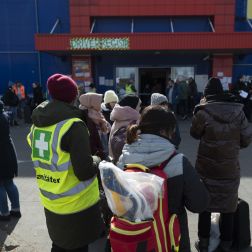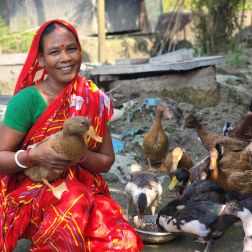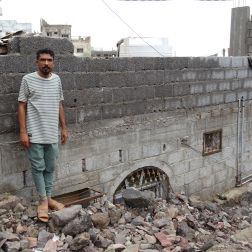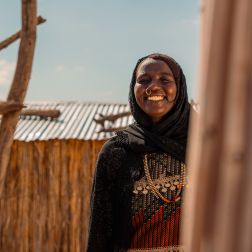- 10 mins read time
- Published: 3rd November 2014
Farmers in Madagascar taking on climate changes & land grabs
It was 8am, the coffee was strong and welcome, the small cakes, some savoury and some sweet, made of rice flour, tasty, similar to the vitumbua that are common in Tanzania. I was in the small town of Mahitsy, about 30 kms from Madagascar’s capital Antananarivo.
Richard Rabetrano was showing me around, giving me some idea of the life and work of farmers in this part of Madagascar. We had started at the market: the essential place for farmers to sell their produce, for the exchange of goods, for meeting, for learning and of course for eating.
At the market a wide range of fresh vegetables and fruit are available as well as other food. There are also shops and traders selling farm inputs, like seeds, equipment, tools and pesticides.
The coffee stall we stopped at is on the side of the cobbled road running through the centre of Mahitsy. We leaned on the counter and watched the busses, oxcarts, cars and above all pedestrians passing in the crowded road, many bringing goods to and from the market and the surrounding shops.
The coffee, grown, roasted, ground, sold and drunk in Madagascar was great and only cost 200 Ariary (about 6c/5p) a cup, the small cakes 50 Ariary (about 1.5c/1.17p) each.
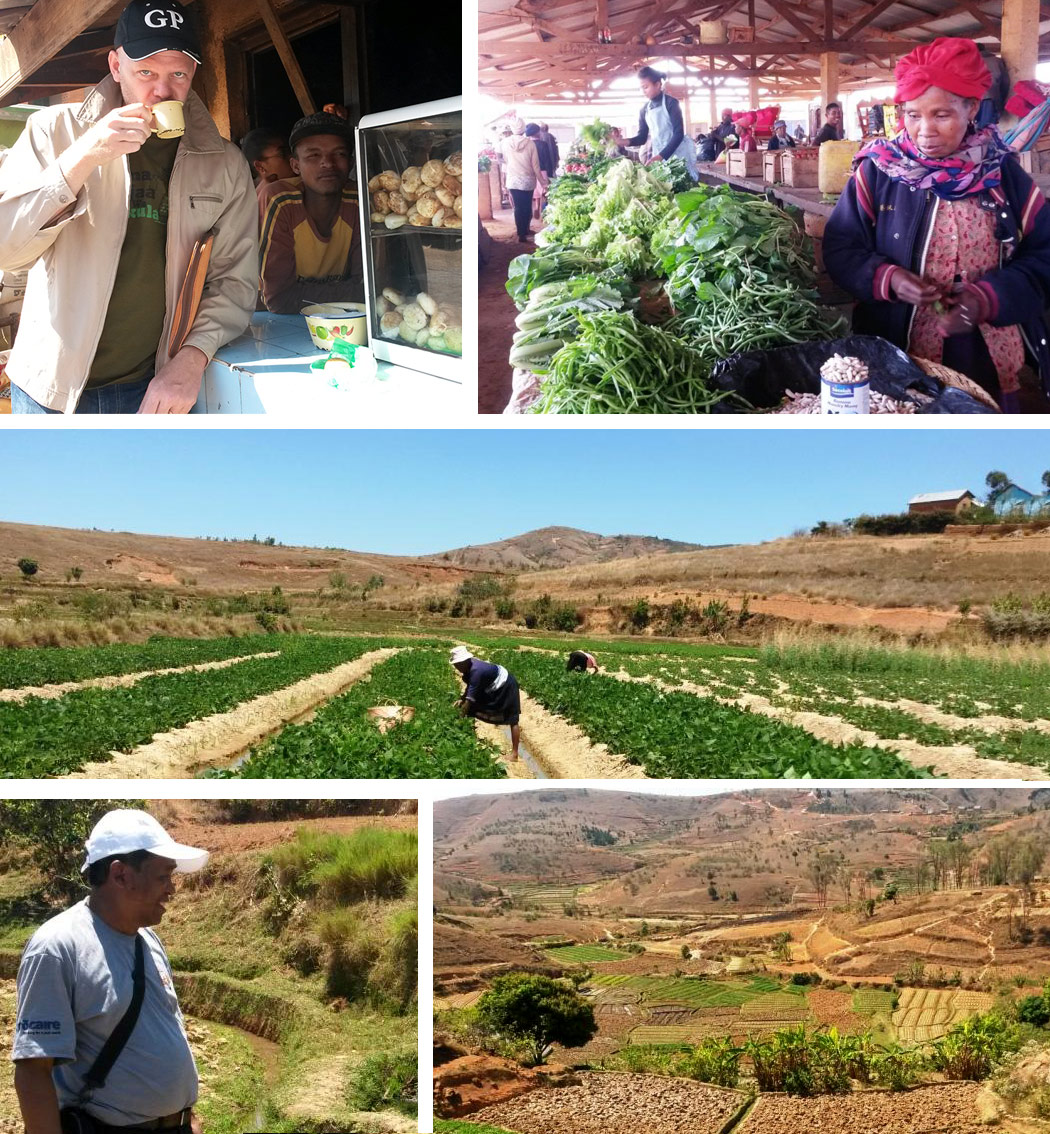
Photos - Top left: Marc has coffee in Mahitsy market – it costs just 6c/5p. Top right: Fresh vegetables at the market. Middle: A husband and wife work in their field of green beans. Bottom left: Rabetrano stands in his field where both he and his neighbouring farmers have to rely on a mere trickle of water to irrigate their fields Bottom right: It is the dry season. In this valley we can see the irrigated fields and the dry land around.
Rabetrano is a local farmer who is part of the leadership of the Eastern and Southern Africa Small Scale Farmers Forum. He and his national farmers’ confederation (Confédération des Agriculteurs Malagas) organised to get the government to allocate land and build better infrastructure for the market we were at.
Oxfam has for years supported ESAFF in its work to link up farmers from across the region, enabling the sharing of experiences and knowledge with each other and also joint advocacy for their essential interests. ESAFF has advocated for farmers, often alongside Oxfam, on issues like trade policy, climate change and land grabs.
Land grabs that in some cases have taken the land that the ESAFF members depend on for their prosperity. Rabetrano and the other farmers I met can work hard, produce crops and set up local markets, but there are policy and other decisions that can undermine all their work.
After the market we visited farms. It is the dry season and crops are only growing in the river valleys where there is enough water. We talked to a husband and wife who were picking green beans in their field.
With carefully constructed irrigation channels these and other farmers are producing beans, peas and other legumes as well as some potatoes, tomatoes and green vegetables. The same fields will be planted with rice once the rain comes.
Rabetrano’s own fields were dry; the clay rich soil hard and empty, aside from some stalks of rice plants left from last season. “There is just not enough water this year,” he explained and showed me the trickle of water he and other neighbouring farmers have to rely on.
“Last year we had good rain and I was able to plant some land throughout the year,” Rabetrano said. Now he is waiting for the rain before ploughing and planting, rain that has become unpredictable over the last years.
Five days before there was a little rainfall and Richard had hired someone with oxen to plough land higher up the hill, but since then there has been no more rain and the soil is dry and dusty; there is no point in planting yet.
Despite the lack of water Rabetrano manages, with careful use of his 5 hectares of land, to produce food for the market and home, supporting himself and his family.
He combines different crops on the same land, sometimes at the same time, and sometimes by rotating crops, to replenish soil fertility and minimise the need for fertiliser. He farms with little environmental impact or carbon footprint.
In another village we found a vibrant cattle market, hundreds of men (yes, it was almost all men) gathered to sell and buy cows. Alongside the field where the market was a line of small buildings contained eating houses (mostly run by women), where a busy trade was being done.
Other businesses were also there to take advantage of the market opportunities. I bought a handmade sisal rope; just in case I bought a cow and needed to lead it home. I had to explain to some of the sellers that getting a cow on the plane was going to be hard. The cattle are used for meat and milk as well as for ploughing and transport.
At Rabetrano’s neat two-floor house we had a tasty and nutritious lunch of rice (from Richard’s fields of course) and spinach with a just a few small morsels of beef mixed in. The meat a small part of this meal, just adding a bit of protein and flavour as meat has done in the diets of many throughout history.
This is not consuming meat in the way the rich of the world now increasingly do with huge environmental and sustainability repercussions.
Rabetrano lives upstairs in the house with his wife and younger daughter (his older children have left home). His sister lives downstairs with her children. On the desk at one end of the combined living and dining room where we were sitting is a computer, the internet modem working via the cell-phone network.
The connection may be a bit slow and expensive, but Rabetrano can be in touch with fellow farmers in different parts of the world and his daughter, who is doing clothes design, can follow international fashion trends. Rabetrano also uses his smart phone to get online and Facebook has been the main way I communicate with him since returning home to Tanzania.
I had come to Madagascar to attend an Africa Forum of the International Land Coalition, which Oxfam is a member of. The Forum brought together organisations working on land rights and land governance issues across Africa to share experiences and develop approaches to ensure good land governance for sustainable development in Africa.
Over the last decades there have been improvements in land policy in many African countries. In 2009 the heads of state of all African countries, meeting in the summit of the African Union agreed on a Framework and Guidelines for Land Policy in Africa. This serves to encourage and guide countries to “Strengthen Land Rights, Enhance Productivity and Secure Livelihoods.”
Such agreements can seem like a lot of talk with little action. Indeed there are real challenges in getting implementation of policies to make real difference in people’s lives. At the same time, however, we are seeing progress and all the organisations gathered at the Forum in Madagascar are working to make the policy commitments known to communities and to people in poverty and pushing to ensure there is implementation.
Rabetrano, like many other farmers in Madagascar, has a document from the local authority confirming his inheritance of land from his parents, but the legal strength of such documents is questionable. There are others who have no documentation at all to show their rights to the land that they depend on and need to invest in for their livelihoods.
Community practice and knowledge of which land belongs to whom continues to be important for people’s sense of tenure security, whether people have documents or not, but this can be hard to defend when there are large government or private investments.
Land reforms in 2005 aimed to give citizens in Madagascar stronger rights over their land and set up a more affordable process for those with land rights to get a proper certificate documenting that right. This has increased the sense of security on their land, for those who have got the certificate.
There are challenges, however, with only a limited number of the certificates issued. Rabetrano has not got one yet, and most of those issued have gone to relatively wealthy people. Although the law calls for gender equality, men are still seen as the owners of land with the result that over 80% of land held by couples has been certified in the name of the man alone.
Large-scale land grabs are a real threat that increases the need for secure land rights and strong organisation of people aware of and able to defend their rights. One land grab in Madagascar involved over a million hectares of land, but was eventually cancelled after protests.
So strong where people’s objections that the deal contributed to the overthrow of the president. Other land grabs continue and as investors seek to profit from the rich natural resources of the country they are too often threatening not only the livelihoods of farmers, like Rabetrano, but also the vibrant markets and other local economic activities that the local agriculture is a central part of.
The area I visited with Rabetrano is in the wealthier highlands of the country, close to the capital city, which means market opportunities and easier access. Not all farmers are as well situated; indeed Madagascar is ranked 155 on the United Nations Development Programme Human Development Index and does have extreme poverty.
What has been good to see is what farmers like Rabetrano can do when the conditions are right. Rabetrano is creating a good quality of life for his family and contributing to the economy. His children have got an education and are having greater choices about what kind of future they want.
This cannot be taken for granted though; the right conditions need to be extended to other farming areas and also defended from the real threats posed by climate change, bad trade deals and land grabs.
Marc Wegerif is a South African, currently based in Tanzania, who has worked on development and human rights issues in a range of organisations for over 25 years and has a Masters in Land and Agrarian Studies from the University of the Western Cape. Marc has focused on land rights issues for much of his professional life and is currently Food and Land Rights Advisor with Oxfam Ireland. In this role Marc is involved with international advocacy and running several multi-country projects. He is married with two daughters. This blog is a personal reflection and the views expressed are not necessarily those of Oxfam.
